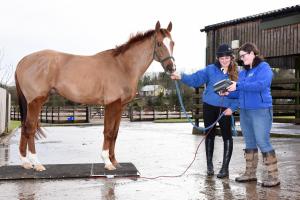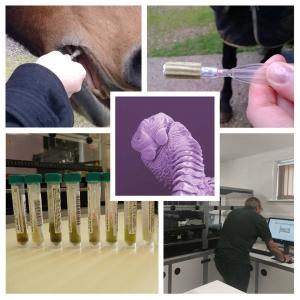Baseline study of the Northern Ireland equine industry
The College of Agriculture, Food and Rural Enterprise (CAFRE) provides a range of education, training and technology transfer programmes for the equine industry.
This baseline study of the Northern Ireland (NI) equine industry was undertaken by CAFRE in 2015 to assess the importance of local horses,
people and places within an economic, social, environmental and political context. This study was led by Dr Stephanie Wood, Senior Equine Technologist, with significant contributions from Rachel Annan, Equine Technologist, Shelley Stuart, Equine Lecturer and Laura Smith, Equine Lecturer.
Information was collated through desk research, on-line study and discussions with industry stakeholders. In this respect I acknowledge the support and assistance which CAFRE received from the equine industry
including the Equine Council for Northern Ireland.
Equine industry projects
Equine weight management
This project aims to promote the use of equine weigh tapes, equine weigh bridges and fat scoring as methods of maintaining horses at a healthy body weight. The project will help owners to identify when their horse is overweight, underweight or of ideal weight and provide accurate measures of horses body weight that are essential for calculating correct feeding rations and medication dosage.

Maintaining horses at a healthy body weight optimises their health, promotes good welfare and can improve competition and breeding performance. Improvement of performance can have positive economic implications due to increased animal value and improved breeding output.
The project will promote the regular use of equine weigh tapes and fat scoring to horse owners to enable necessary changes in body weight and associated feeding to be identified and provide opportunities to weigh horses twice each year at specified locations. Project participants will submit their horses weigh tape and fat score results to CAFRE on a monthly basis via an online form. This information will develop an understanding of the health status of the Northern Ireland equine population and enable fluctuations in equine body weight to be identified.
Equine parasite control
This project aims to promote the use of various methods of detecting parasite burdens in horses and reduce resistance of parasites in the equine population in Northern Ireland.
A targeted worming approach, in which anthelmintics are only used when the presence of parasites are confirmed, helps to prevent overuse of the active ingredients.
A faecal worm egg count (FWEC) is a test that is carried out to see how many parasite eggs are present in a sample of a horse’s faeces to identify horses with high parasite burdens. Horses with a FWEC of more than 200epg (eggs per gram of faeces) should be treated with appropriate anthelmintics. Those with lower FWECs do not require treatment, preventing the unnecessary and ineffective use of anthelmintics.
The test for tapeworm in horses measures antibodies in saliva which are specific to tapeworm. If a horse has a borderline or moderate/high burden, then it is recommended that the horse is treated with an appropriate anthelmintic.

The project will promote the use of FWEC’s and the equine saliva test for Tapeworm to horse owners and adopt a targeted parasite management programme. Project participants will submit their results to CAFRE on a quarterly basis via an online form. This information will develop an understanding of the equine parasite burden in Northern Ireland.
Equnine management notes
Useful articles with advice and guidance for the equine industry, including issues such as weaning foals, tape worms in horses and equine euthanasia.
